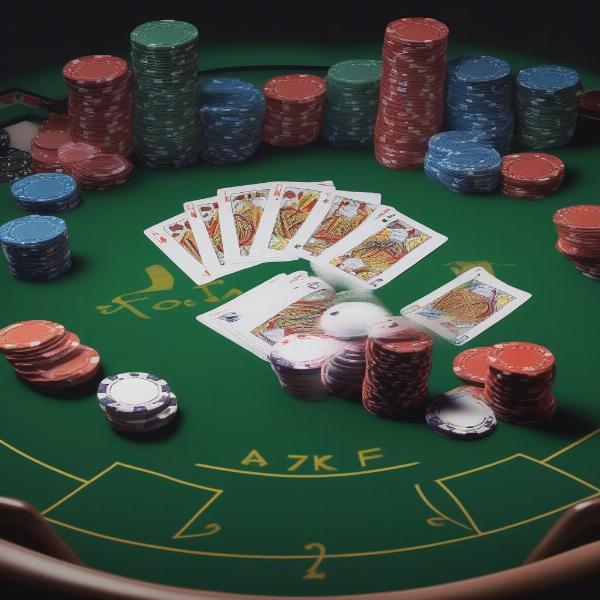At SupremeDuelist.blog, we often delve into the intricacies of gaming, and poker is a classic example that raises many interesting questions about player conduct. One frequently asked question is, “Can You Leave A Poker Game At Any Time?” The short answer is typically yes, but there are nuances that all poker players should understand. Leaving a game abruptly can have social implications and can depend on whether you are in a casual or a structured game.
This article will explore the rules and etiquette surrounding leaving a poker game, focusing on different scenarios, from casual home games to professional tournaments. We will clarify when leaving is acceptable, when it’s frowned upon, and the common practices you should be aware of.
The General Rule: Freedom to Leave
Generally, in most poker settings, players are free to leave a game whenever they choose. This is especially true in cash games, whether they are held at a casino, in a friend’s house, or online. The fundamental nature of these games is that players buy in with real money and can cash out whenever they feel like it. This flexibility is a key part of the appeal of poker as a casual, social game.
However, while freedom is the general rule, there are factors to consider that can influence whether and how you should leave. These factors often revolve around common courtesy and the type of game you are playing.
Cash Games: Flexibility and Etiquette
Freedom in Cash Games
In a cash game, the most significant rule is that a player’s chips represent their real money. This means, by design, that players can choose to leave with whatever chips they have left at any moment. Once you’ve decided you want to leave, you simply cash out with the cashier or the host, taking with you the amount you have on the table. This gives you a level of control over your poker experience, allowing you to leave whenever your bankroll or your spirit dictates.
Etiquette Matters
While you have the right to leave, proper etiquette dictates how you should do it. It is considered rude to abruptly leave in the middle of a hand. It’s better to wait until the end of a hand. If you’re at a home game, you may want to give a heads-up to the host to give them time to adjust for the game and seating arrangement. In casinos, it’s generally understood, but alerting the dealer when you want to leave also creates a smoother exit. It is also important to avoid disrupting the flow of the game as you prepare to leave. Rushing or making excessive noise when exiting the game can be distracting for those still playing.
Table Stakes
The concept of table stakes also plays a crucial part here. When you sit down at a poker table, the money you bring to the table is your commitment to that game, meaning you can’t reach into your wallet mid-game, but also mean that you are free to leave with the money you have in front of you. This is a fundamental poker concept that reinforces the freedom and flexibility players have to manage their play.
 player-leaving-poker-game
player-leaving-poker-game
Tournament Play: Different Rules Apply
Commitment in Tournaments
Unlike cash games, tournament play is a more structured experience. When you enter a tournament, you are committing to playing until you’re eliminated or win. Once the tournament has started, it is generally expected that you stay until the end, unless circumstances beyond your control force you to leave.
Penalties for Leaving
Leaving a tournament prematurely can lead to penalties or disqualifications. Generally, if a player leaves a tournament, they forfeit their entry fee, and may not receive any of the prize pool. Some tournaments might have stricter policies where a participant could be restricted from future events for leaving without a valid reason.
The Only Exception
A legitimate reason to leave a tournament would be if there is a true emergency such as a sudden illness or another urgent situation that demands immediate attention. However, in such cases, it is essential to notify the tournament director as quickly as possible to mitigate any disruption.
Online Poker: The Convenience of Leaving
Easy Exits
Online poker platforms follow the basic rules of live games. In cash games, you can leave a table at any time by simply clicking a button. However, similar to live cash games, it’s considered better etiquette to finish the current hand. This quick exit is part of the charm of online poker because it lets people easily move between tables or stop playing.
Tournament Rules
Online poker tournaments also come with their specific rules. As in live tournaments, leaving an online tournament mid-game usually means you’ll forfeit your buy-in and any potential winnings. However, the convenience of playing online also means there are fewer obstacles to leaving the game quickly and with minimal disruption.
Frequently Asked Questions
What if you need to leave for an emergency?
Most poker settings, be it home games, casinos, or online, understand emergencies. Communicate with the host, dealer, or tournament director as soon as you can, and most often, they’ll be accommodating. Remember that leaving abruptly may still lead to some repercussions, but being honest and clear about the circumstances is the best approach.
Can you leave if you’re having a bad night?
In cash games, yes. Players often leave if they’re having a run of bad luck or if they are feeling tired. There is no obligation to continue playing if you are no longer enjoying the game. However, you should always leave in a manner that minimizes disruption to other players.
How should you handle leaving a home game?
When you’re playing with friends, it’s especially important to be considerate. Let the host know in advance and finish your hand gracefully. If you’re planning to leave soon, let them know before a new hand is dealt. It is also polite to thank the host when leaving for their hospitality.
Can you leave a tournament to go on a break?
In most tournaments, scheduled breaks are part of the game. You are expected to remain in the tournament until you are eliminated, even if you feel the need for a short break. If you need to leave outside of these breaks, it can result in a forfeit.
Does leaving impact your reputation at the table?
Yes, in some cases, your exit can impact how other players perceive you. Leaving abruptly or frequently might be seen as poor behavior. Players who behave respectfully and follow poker etiquette tend to gain a better reputation.
 poker-tournament-players
poker-tournament-players
Expert Insight
“Understanding the rules around leaving a poker game is just as important as knowing the poker hands,” says Dr. Eleanor Vance, a noted expert in gaming psychology. “Players should always prioritize respectful conduct and clear communication when leaving, to preserve the social fabric of the game.”
“From a strategic point of view, a cash game player should feel comfortable taking a break from the game if he or she is no longer at their best, whether mentally or emotionally,” states James Sterling, a professional poker analyst. “Being able to leave at any time is one of the best things about cash games and is vital for the management of your bankroll and mental state”
Conclusion
In conclusion, whether you can leave a poker game at any time depends primarily on the type of game you are playing. In cash games, the freedom to leave is a fundamental aspect of the experience, offering control and flexibility. However, this freedom should be exercised with consideration for others and the etiquette of poker. In tournaments, the rules are more strict, requiring commitment until elimination or completion of the event, emphasizing commitment and respect for the structure of the game. By adhering to these rules, you can ensure a more pleasant and responsible poker playing experience. Remember to visit SupremeDuelist.blog for more valuable insights on poker and other exciting games. Next time you play, make sure to understand the game’s regulations but more importantly, the social expectations to enjoy the game to its fullest.
Leave a Reply